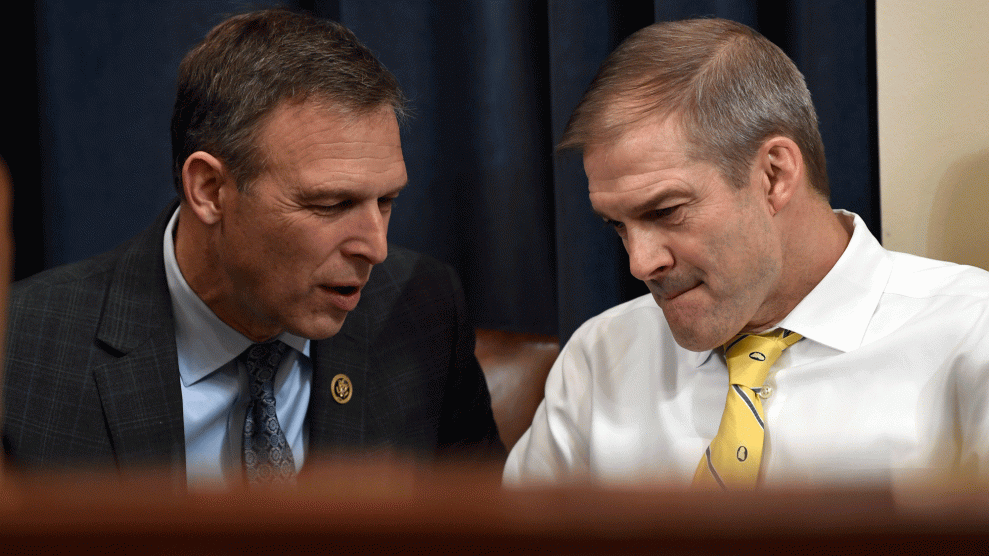
Scott Perry (R-Pa.) confers with Jim Jordan (R-Ohio) during Donald Trump's first impeachment.Susan Walsh/AP
On the first day of the new Congress, Rep. Jim Jordan (R-Ohio) delivered one of the nominating speeches for Rep. Kevin McCarthy (R-Calif.), who was seeking the House speakership. Jordan bemoaned a “government that has been weaponized” against the American people and called for greater accountability. The next day, during a second round of failed votes for McCarthy, Rep. Scott Perry (R-Pa.), the leader of the far-right House Freedom Caucus, voiced a similar sentiment but in opposing McCarthy: “Washington is broken… We have an administration that has contempt for the American people.” Though the two men were on different sides in this battle royal, they were united in hypocrisy, for each of these decriers of abusive power had been collaborators in Donald Trump’s public crusade to promote the lies about the 2020 election that led to the January 6 insurrectionist attack on the Capitol and in Trump’s devious plotting to overturn the election and upend American democracy.
Their roles in the House GOP’s crapshow illustrated a profound fact largely overlooked in this hullabaloo: The political chaos that brought the House of Representatives to a standstill was being perpetuated by a party that two years earlier had tried to sabotage the republic and had championed falsehoods and conspiracy theories that led to seditious violence in the very chamber where the speakership fight was now occurring. Of the 222 Republicans currently in the House GOP caucus, 119 had on January 6, 2021, after the Trump-incited riot, affirmed the false charge of a stolen election by voting to block certification of Joe Biden’s victory. This group included most of the anti-McCarthy bloc, among them Reps. Andy Biggs, Paul Gosar, Lauren Boebert, Matt Gaetz, and Ralph Norman, who in January 2021 texted then-White House chief of staff Mark Meadows that Trump should consider “Marshall Law” to remain in office. And this group included McCarthy.
The GOP civil war in the House was being fought over whether to elevate an election denier who had helped spread the Big Lie that spurred violence to a position that is second in the line of presidential succession. Yet McCarthy’s participation in that assault on democracy was not an issue. For Republicans, it was a prerequisite.
Though most Republicans elected to the new Congress share culpability for January 6 and the failed effort to blow up the 2020 election, Perry and Jordan stand out for their significant participation in Trump’s anti-constitutional and arguably criminal caper.
The House January 6 committee’s report details Perry as a key conspirator in one of Trump’s plots to reverse the election. After the 2020 election was called, Perry was a prominent cheerleader of Trump’s fraudulent claim the election had been stolen from him. He was one of 27 Republican House members who signed a letter requesting that Trump “direct Attorney General Barr to appoint a Special Counsel to investigate irregularities in the 2020 election.” He attended a December 21 Oval Office meeting with at least 10 other congressional Republicans to discuss a strategy for objecting to the electoral college votes on January 6. And with 125 other House Republicans, he supported Texas’ lawsuit that called for throwing out the votes of Pennsylvania and three other states.
But Perry outdid other GOP election deniers with his behind-the-scenes scheming to corrupt the Justice Department.
In late December 2020, after Barr resigned (having told Trump privately and stated publicly there was no evidence of any significant electoral fraud), Trump relentlessly leaned on the Justice Department—mainly, Acting Attorney General Jeffrey Rosen and his deputy, Richard Donoghue—to affirm his baseless assertion that the election had been rigged. They resisted and repeatedly told Trump the allegations of fraud were untrue. Trump was not getting what he wanted from the department.
This is where Perry came in. He found a Justice Department official named Jeffrey Clark who was running the Environment and Natural Resources Division. Clark had nothing to do with investigating the allegations of election fraud, but he was willing to echo and legitimize Trump’s false charges. Perry introduced Clark to Trump, arranging a meeting between the two in the Oval Office on December 22. As the January 6 committee noted, “Clark’s contact with President Trump violated both Justice Department and White House policies designed to prevent political pressure on the Department.”
Perry also sent numerous text messages to Meadows urging that Clark be promoted within the department, presumably to a position in which he could compel the Justice Department to assist Trump’s bid to retain power. In one message, Perry referred to the upcoming certification of the electoral vote and declared, “11 days to 1/6… We gotta get going!”
Though Rosen and Donoghue ordered Clark to have no further contact with Trump, Clark continued to meet with Trump and Perry. Perry also directly confronted the Justice Department about its refusal to back up Trump’s false allegations. He called Donoghue on December 27 and assailed the FBI and the department for not finding evidence of election fraud. He added that “Clark would do something about this.”
That night, Perry emailed Donoghue material alleging that election authorities in Pennsylvania had counted 200,000 or so more votes than had been cast—a claim that he and Trump raised publicly. No such thing had happened. Perry was spreading disinformation in an attempt to disenfranchise the voters of his own state.
Meanwhile, Clark—Perry’s man at the Justice Department—was pushing an underhanded plan to keep Trump in power. This included proposing to send a letter to the state legislature of Georgia—and those of other swing states—that falsely declared that the Justice Department had “identified significant concerns that may have impacted the outcome of the election in multiple States, including the State of Georgia.” The letter recommended that the state legislature call a special session to evaluate potential election fraud. The draft of this letter referred to the fake electors that Trump and his campaign had organized.
When Rosen and Donoghue refused to sign this letter, Trump moved to boot Rosen and replace him with Clark. At a combative Oval Office meeting on January 3, Rosen, Donoghue, White House counsel Pat Cipollone and others strenuously opposed Clark’s appointment and told Trump it would lead to massive resignations at the department. Only then did Trump retreat on appointing Clark acting attorney general. This attempt to enlist the Justice Department for a coup was over.
The Trump-Clark scheme, in which Perry was a major plotter, was cited by the House January 6 committee in its final report as one basis for its criminal referral of Trump and others. And apparently Perry had some concerns for his own legal safety. According to the committee, after January 6, he reached out to White House staff and asked to receive a presidential pardon. (He did not receive one.)
In August, the FBI seized Perry’s cell phone, presumably as part of its investigation of the Trump-Clark operation. Perry claimed he was told he was not the subject of an investigation. The January 6 committee subpoenaed Perry, but he refused to show up for a deposition, and the committee subsequently referred him to the House Ethics Committee for sanction for failing to comply with the subpoena.
As for Jim Jordan, the January 6 committee declared he was “a significant player in President Trump’s efforts.” It noted:
He participated in numerous post-election meetings in which senior White House officials, Rudolph Giuliani, and others, discussed strategies for challenging the election, chief among them claims that the election had been tainted by fraud. On January 2, 2021, Representative Jordan led a conference call in which he, President Trump, and other Members of Congress discussed strategies for delaying the January 6th joint session. During that call, the group also discussed issuing social media posts encouraging President Trump’s supporters to “march to the Capitol” on the 6th.
The committee’s report points out that Jordan was in touch with Meadows and Trump in the days before the January 6 riot. On January 5, he texted Meadows that Vice President Mike Pence should “call out all the electoral votes that he believes are unconstitutional as no electoral votes at all.” That is, Jordan was urging an unconstitutional action to achieve a Trump power-grab that would thwart the peaceful transfer of power.
On January 6, Jordan spoke with Trump at least twice, and, according to the committee, “he has provided inconsistent public statements about how many times they spoke and what they discussed.” He also spoke to Rudy Giuliani at least twice in the hours after the riot, as Giuliani continued to encourage members of Congress to block the certification of the election. In the following days, the committee noted, Jordan discussed with White House staffers the prospect of presidential pardons for members of Congress.
Like Perry, Jordan was subpoenaed by the January 6 committee and refused to cooperate, earning a referral to the House Ethics Committee—as did McCarthy. The committee wanted information from McCarthy regarding his conversations with Trump and Pence on and about January 6. He, too, would not cooperate.
As the McCarthy drama has played out, critical participants have been election deniers who not long ago sought to undermine democracy and whose actions led to the domestic terrorism of January 6. McCarthy’s foes, his defenders, and McCarthy himself all were part of the efforts to subvert the Constitution following Biden’s victory. Moreover, whatever happens with McCarthy, these enemies of democracy will end up with important positions in the House. Jordan is expected to become chair of the Judiciary Committee. Perry will likely remain chair of the House Freedom Caucus, which will continue as a band of extremists and plague whichever Republican becomes speaker. This absurd speakership fight is a reminder that Republicans who tried to annihilate the constitutional order and who bolstered conspiracy theories and lies that ignited violence have attained power and influence. The guilty have been rewarded.












